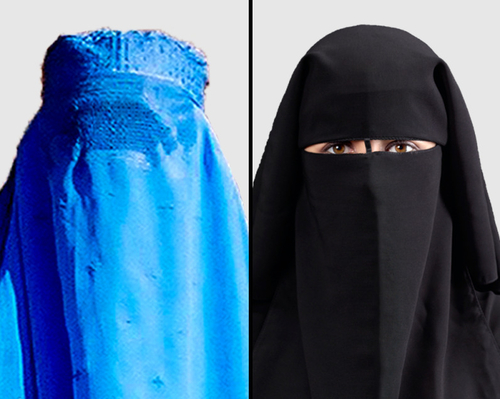A short new book argues for permitting women to wear tent-like full-body coverings (sometimes but erroneously called veils) in public places. Raphael Cohen-Almagor, a self-described “poet, human rights and peace activist,” as well as a professor at the University of Hull, offers sundry reasons for this surprise conclusion, including:
The ban on the burqa and the niqab is wrong in principle, is counter-productive and illiberal. It fails to respect freedom of religion which is a basic human right. It undermines the agency of women it claims to emancipate. … and it offends the dignity of women who voluntarily opt to wear this garment for religious reasons. … It undermines the agency of women it claims to emancipate. …The ban that was designed to liberate women actually increases their isolation.
Cohen-Almagor devotes much of The Republic, Secularism and Security: France versus the Burqa and the Niqab (Cham, Switzerland: Springer, 2022) to refuting arguments heard in France for the ban on burqas and niqabs in public: these garments oppress women and diminish their dignity, they challenge French identity and unity, they are offensive, they cause sensory deprivation and vitamin D deficiency, and they undermine public safety and order.
On this last topic, Cohen-Almagor uses me as his foil:
Daniel Pipes (2018) compiled incidents in which niqabs and burqas were used for terrorist incidents. He argues that both garments should be banned on security grounds. However, there are many things that are used and abused but still, they are not banned in democracies. Chemistry books are often used for very good, productive purposes but sometimes they are abused for terrorist bomb-making. Motorcycle helmets are used to protect human lives, but sometimes they are abused to rob banks and to serve anti-social purposes. Knives play an essential role in the kitchen and at the dinner table, but they are also used for murder. The Internet contains the best products of humanity, but it is also abused by terrorists, criminals and hate mongers. The telephone connects between families and friends, but it is also abused to concoct crimes. The fact that a dress is used and abused in different ways does not justify banning the dress.
My response: Of course, chemistry books, motorcycle helmets, knives, the Internet, and the telephone can be abused. Indeed, all foods and drinks, all types of clothing, every means of communication and transportation, all structures, every technological breakthrough, and so forth, ad nauseum, can be abused. Further, one can walk or sleep before engaging in either good or ill deeds. In the end, all things and actions are dual use, meaning they have potentially benign or malign purposes. Cohen-Almagor’s seemingly clever logic leads only to triviality.
For that matter, even burqas and niqabs can be used for benign purposes: to help a supermodel sneak around the paparazzi, meet a lover, retrieve an abducted child, avoid persecution, not catch a virus, capture a wanted suspect, flee an oppressive country, or escape murderers.

But these rare positive uses pale beside the massive number of negative ones. To take the city where I live, Philadelphia, criminals used burqas and niqabs as accessories in at least 34 incidents over 9 years, or almost one every three months. These included violent robberies of many banks, of a jewelry store, a real estate office, a spa, a pharmacy, a grocery store, a dollar store, and even a gun shop. They also included the abduction and rape of a 5-year-old girl and the murder of a policeman.
In addition, families use these all-encompassing articles of clothing to oppress women and jihadis use them to engage in violent operations. Finally, they harm health because insufficient sunlight “results in vitamin D deficiency, which can lead to bowlegs and thickened wrists and ankles, muscle and bone pain, pelvic fractures during childbirth, dementia, rickets, osteomalacia, and perhaps multiple sclerosis. Also, rashes, headaches, and respiratory disease sometime result or even strangulation. Babies suffer from seizures, growth retardation, and muscle weakness and fractures.”
It bears noting that burqas and niqabs are an option, not something required by the dictates of Islam, as indicated by the vanishingly few Muslim women who wear them voluntarily.
The burqa and niqab may not look like hard drugs, machine guns, or explosives, but like them, they endanger the public good by concealing the identity of their wearers. Common sense demands that these garments be banned from public places.
Mr. Pipes (DanielPipes.org, @DanielPipes) is president of the Middle East Forum. © 2022 by Daniel Pipes. All rights reserved.
